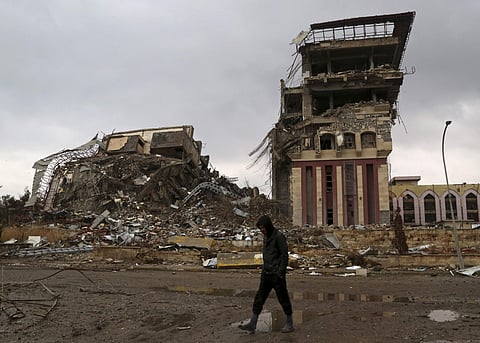

MOSUL: Iraqi forces on Sunday retook two areas from the Islamic State group in Mosul, sealing their control of the east bank three months into an offensive to reclaim the city.
They recaptured "Al-Milayeen neighbourhood and Al-Binaa al-Jahiz area and raised the Iraqi flag over the buildings", the military said in a statement.
"These are the last neighbourhoods of the centre of the city (on) the left bank," the statement said, referring to eastern Mosul.
It also said that federal forces had retaken control of the road linking Mosul, Iraq's second city, to Dohuk, a provincial capital in the west of the autonomous region of Kurdistan.
The latest progress effectively seals the Iraqi forces' control over the east bank, with only the neighbourhood of Rashidiyah, on Mosul's northern edge, left to retake.
Prime Minister Haider al-Abadi and top commanders in the Counter-Terrorism Service, which has spearheaded operations inside Mosul, had already declared the city's east "liberated" on Wednesday.
The Joint Operations Command coordinating the battle against IS in Iraq had said then that a few more days would be needed to clear the last pockets of holdout jihadists.
Iraq's top brass and its foreign allies were expected to confer in the coming days on the strategy to adopt to conquer the west bank of Mosul, which is still under full IS control.
A huge offensive, Iraq's largest military operation in years, was launched on October 17 to retake Mosul, the last major stronghold IS had in the Iraqi part of its self-proclaimed and now crumbling "caliphate".
- West Mosul next -
Residents of parts of eastern Mosul, some for several weeks already, have tried to resume a normal life, despite the circulation of goods being restricted.
On Sunday, a few dozen students and activists gathered at the gate of the University of Mosul, which IS had used as a headquarters during its two-and-a-half-year rule and which was severely damaged in the fighting.
They celebrated the recapture of one of the country's most prestigious institutions by chanting slogans, raising an Iraqi flag above the arch that marks the campus entrance and unfurling a banner calling for its swift reopening.
The west side of Mosul is a little smaller but more densely populated and home to some of the jihadists' traditional bastions.
It contains the old city of Mosul, a maze of narrow streets crammed with shops, mosques and churches that will be impassable for larger military vehicles.
That area houses Al-Nuri mosque where the IS group's Iraq-born supremo Abu Bakr al-Baghdadi declared a caliphate in June 2014 after his forces took the city.
"IS and Sunni insurgent groups also have had historical support zones in western Mosul," said Patrick Martin, Iraq analyst at the Institute for the Study of War, warning that federal forces there may receive less warm a welcome than in the east.
The United Nations and other relief organisations had planned for an unprecedented exodus of up to one million people, but so far about 160,000 civilians have been displaced as a result of the Mosul offensive.